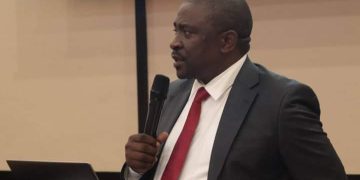Mohale’s Hoek – In a significant step towards fostering economic awareness and promoting trade compliance, Revenue Services Lesotho (RSL) hosted a symposium under its ongoing “Mphahlolle” Awareness Campaign. The event, held at Hotel Mount Maluti, gathered business leaders, entrepreneurs, and citizens to discuss the impact of international trade agreements and tax treaties on Lesotho’s economic development.
Speaking at the symposium, the Acting Commissioner General of RSL, Mr. Rakokoana Makoa, highlighted the transformative potential of tax treaties and trade agreements in shaping Lesotho’s economy. He emphasized that the agreements Lesotho has signed and ratified are not mere formalities but are powerful tools for driving innovation, fostering growth, and creating prosperity for Basotho. “Today’s gathering is a reflection of our shared commitment to promoting the economic development of Lesotho by leveraging the numerous benefits embedded within the international agreements that our country has signed and ratified,” he said.
Makoa cited frameworks such as the African Continental Free Trade Agreement (AfCFTA) and the Southern African Customs Union (SACU) as examples of initiatives that reduce trade barriers, eliminate double taxation, and enhance regional integration. He also noted the role of the SACU Authorized Economic Operator (AEO) program in rewarding compliant traders with expedited customs clearances, which reduces costs and delays in cross-border trade. “Through initiatives like the AEO program, we aim to streamline customs processes and enhance the competitiveness of Basotho businesses,” he remarked.
The symposium also featured a presentation by Mr. Setsoto Ranthota from RSL, who explained the importance of tax treaties in facilitating cross-border trade and investment. Ranthota described tax treaties as agreements that reduce tax rates, lower compliance costs, and prevent fiscal evasion. “They help facilitate smoother international business transactions by eliminating double taxation, ensuring fair tax treatment for all parties involved,” he said.
Responding to concerns raised by attendees about double taxation at border posts, Ranthota advised caution against unofficial taxation practices that do not include receipts. He also emphasized the importance of legitimate invoices, warning of an increase in fraudulent tax documents. He clarified that the taxes paid on registrable goods, such as motor vehicles, are refunded once the items are registered, as unregistered goods cannot be taxed under RSL’s policies. Furthermore, he encouraged businesses to properly identify re-imported and re-exported items to avoid unnecessary taxation.
Mr. Thapelo ‘Moleli, another speaker at the event, discussed the opportunities provided by the AEO strategy, which RSL has adopted to enhance export compliance. He explained that this strategy is aimed at improving supply chain efficiency, reducing costs, and creating better trading opportunities for Basotho. He also noted that SACU member states, including Botswana, Eswatini, Namibia, and South Africa, are part of the initiative, with plans to expand beyond SACU to open up new markets.
The event concluded with a call to action from Makoa, who urged attendees to actively engage in discussions and take full advantage of the opportunities presented by international agreements. “The true potential of these instruments can only be realized if we understand them and apply them effectively in our business practices,” he emphasized.
By hosting this symposium, RSL has demonstrated its commitment to educating citizens and businesses about the role of tax and customs policies in fostering economic growth. Through initiatives like the “Mphahlolle” Awareness Campaign, RSL is paving the way for Basotho businesses to thrive in regional and global markets, ensuring that the benefits of international agreements are fully realized for the country’s prosperity.




